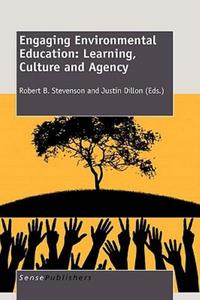Introduction to issues in learning, culture and agency in environmental education
Stevenson, Robert B., and Dillon, Justin (2010) Introduction to issues in learning, culture and agency in environmental education. In: Stevenson, Robert B. , and Dillon , Justin, (eds.) Engaging Environmental Education: learning, culture and agency. Sense Publishers, Rotterdam, The Netherlands, pp. 3-10.
![[img]](https://researchonline.jcu.edu.au/19483/1.hassmallThumbnailVersion/19483_Stevenson_%26_Dillon_2010_Book_Cover.jpg)
|
Image (JPEG) (Book Cover)
- Cover Image
Download (39kB) |
|
|
PDF (Published Version)
- Published Version
Restricted to Repository staff only |
Abstract
The idea for this book emerged from a symposium at the Annual Meeting of the American Educational Research Association (AERA) in San Francisco in 2007. The title of the symposium was 'International Perspectives on Environmental Learning, Participation and Agency'. Not only were we, as discussants at that symposium, impressed by the quality of the papers presented, but we noted a common and important theme that was highly consistent with the perspectives on learning and learners embedded in the international goals and discourse of environmental education (EE) and education for sustainable development (ESD).
That theme, and the rationale for this book, emphasizes the importance of engaging learners as active agents in thinking about and constructing knowledge about the need for and the ways of developing a more sustainable and equitable quality of life on a global scale. Rather than treating students and adults as passive recipients of other people's knowledge, environmental learning and action are viewed as proceeding hand-in-hand and are viewed as holistic, collaborative, and democratically participative. The chapters in this book are intended to examine efforts - in formal, non-formal and informal educational settings in a wide range of international contexts - to create environmental learning that matches this rhetoric.
The title of this book is intended to reflect the dual challenge of the need for individuals, institutions and communities to engage with environmental education and for environmental education and learning itself to be engaging. The subtitle represents our recognition, as we read the first drafts of chapters that came in and with the benefit of hindsight, that an additional important theme was evident, namely the role of culture. Participation is still an important dimension of the book, as readers will discover for themselves, but the impact and effect of culture on learning and agency seems, to us at least, to be an even more fundamental theme.
We have tried to highlight the value and importance of culture by organising the chapters into pairs according to their context. So, for example, the first pair of chapters focuses on learning and agency in formal education contexts whereas the next are set in the contexts of communities. Within each pair, we hope that there will be sufficient contrast to enable readers to see the value of both perspectives and sufficient overlap to justify them being put in tandem.
In collections such as this one, the job of the editors is multi-faceted. The first task is to recognise the potential for a collection of contributions to add something to colleagues' work beyond cataloguing related studies. The idea to put together this book emerged within a very short time after the AERA symposium. However, on reflection, we decided that to tell althe whole story, we should invite more contributors to add their perspectives and wisdom.
| Item ID: | 19483 |
|---|---|
| Item Type: | Book Chapter (Non-Research) |
| ISBN: | 978-94-6091-160-6 |
| Date Deposited: | 01 Mar 2012 06:55 |
| FoR Codes: | 13 EDUCATION > 1303 Specialist Studies in Education > 130399 Specialist Studies in Education not elsewhere classified @ 100% |
| SEO Codes: | 93 EDUCATION AND TRAINING > 9399 Other Education and Training > 939999 Education and Training not elsewhere classified @ 100% |
| Downloads: |
Total: 390 Last 12 Months: 5 |
| More Statistics |



